October, 2020
An analysis of the status of women in the construction industry – In conversation with Ms. Jayasree and her insights about what women do in this industry and why
7 minutes read
Take a second and think about women in construction. What are the images that immediately flash in your mind? Probably images of women carrying bricks, women shoveling sand, women looking at complex floor plans or women engineers wearing hard hats walking along the site are what you thought of. But how many of us have seen a woman carpenter or a woman plumber?
This is one of the jarring observations in the construction industry. Women are conspicuously absent in the middle of the skill spectrum.
According to the Participation of the Female Workers in the Construction Industry in India: A Review (October 14, 2014) around 80% of the women labourers in construction are involved in unskilled work.
And in this scenario, a centre in Kottayam, Kerala stands tall, as a beacon of hope. Archana Women’s Centre, set up in 2004 has trained around 2500 women so far in various fields like carpentry, masonry, wiring and plumbing.the guiding principle of the centre is that skills training for women is the way forward to bringing about gender equality in the occupational spectrum. In conversation with Ms Jayasree, program coordinator and training manager, who has been a part of the organisation since its inception.
- What was the inspiration behind starting the program? How did it evolve to the current structure?
Sr Thresiamma Matthew is the brains and minds behind this. In 1989, she was involved in socio-economic Units Kerala, now SEU Foundation, in a water and sanitation project in Thrissur district in Kerala. It was a huge project supported by The Netherlands, to build toilets for the poor in selected 72 panchayaths of Kerala, where water supply was the major component. The project covered 24 panchayats in Thrissur district. Thousands of latrines had to be built in these panchayaths with full people’s participation. Back then, the total wages for constructing a toilet was 400 rupees, 350 of which went to the mason and 50 rupees to the labourer who helped him, who was usually a woman. This deep discrimination in wages for the comparable work disturbed her deeply. The idea of training women as a latrine mason was dawned in the mind of Thresiamma Ma’am which was outright rejected and opposed by all including women, as it is not culturally suited. After a lot of persuasions and a motivation a team of 12 women laborer who worked on this project as helpers formed the first batch of skill trainees of Thresiamma Ma’am. Initially, they were obstructed to construct toilets in the households, as no one believed that women can do it and they feared that the toilet would not be strong! With a lot of efforts, Thresiamma Ma’am overcame these hurdles and proved to the world that it is possible for women by giving the capacity to over 3,000 women to be masons throughout Kerala. These women ‘s battalion was formed into a society – The Jeevapoorna Women Masosn’s society in Thrissur. They own a training center, 2 concrete brick making units, one tiles production unit, one door-window frame unit, and a canteen. It is the result of the determination and empathy that Thresiamma Ma’m had for the poor exploited women. The women’s masons program was welcomed by the Kerala Government in the total sanitation mission, by UNICEF, World Bank, and other NGOs within India and abroad.
Till 2004, all her activities were centered in Thrissur. In 2004, an office was set up for carpentry training in Chellanam, a village near Kochi. In 2009, Archana Women’s Centre, in its current form was set up in Kottayam. The inspiring fact here is that the offices, spanning 5000 sq. ft. were constructed by the workers who were previously trained by Thresiamma Ma’am. In the training Centre itself, they have a concrete block making unit, carpentry unit, plumbing training unit, etc. Since 2004 we have given training to more than 2500 women from different districts of Kerala and Tamil Nadu.
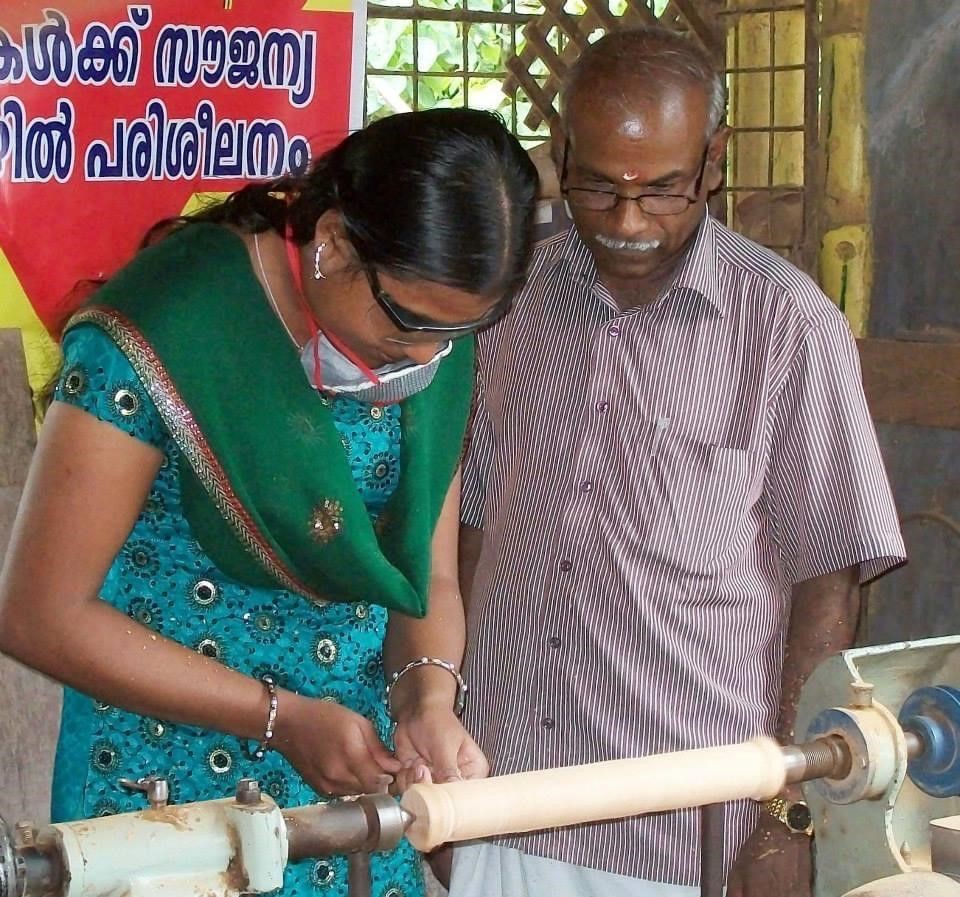
- What are the various training programs offered at the centre?
The program started with masonry and carpentry training. This was followed by training in plumbing, electricity, wiring, and tailoring. Recently, we have started training in Ferrocement technology and bamboo construction. In addition to technical training, we also have social training embedded in the program.
- Can you tell me more about how the training program is structured?
The first month is a general training program where basic training in various fields is provided. The trainees are graded on 15 odd parameters which include time management, punctuality, interaction skills, and so on. Training is provided by experts in the respective fields and sometimes by women who have received training from the institute. At the end of the one month, we talk to them about their progress. We make sure that only constructive criticism is provided. For example, we don’t say “You are not doing well”, instead we say “You can do better”.
After one month of general training, based on the result analysis, we provide them with specialised training. Then, they are taken to sites to get practical training. Working on an actual site also acts as a confidence booster and helps dispel the doubts they have. The next step is excellence training where services of experts are availed. There is adequate monitoring at each stage. Once they have completed their training, we bring them back for one day a month so that they can know their progress and the workers share their issues. We try to provide them with a platform where they can talk openly.
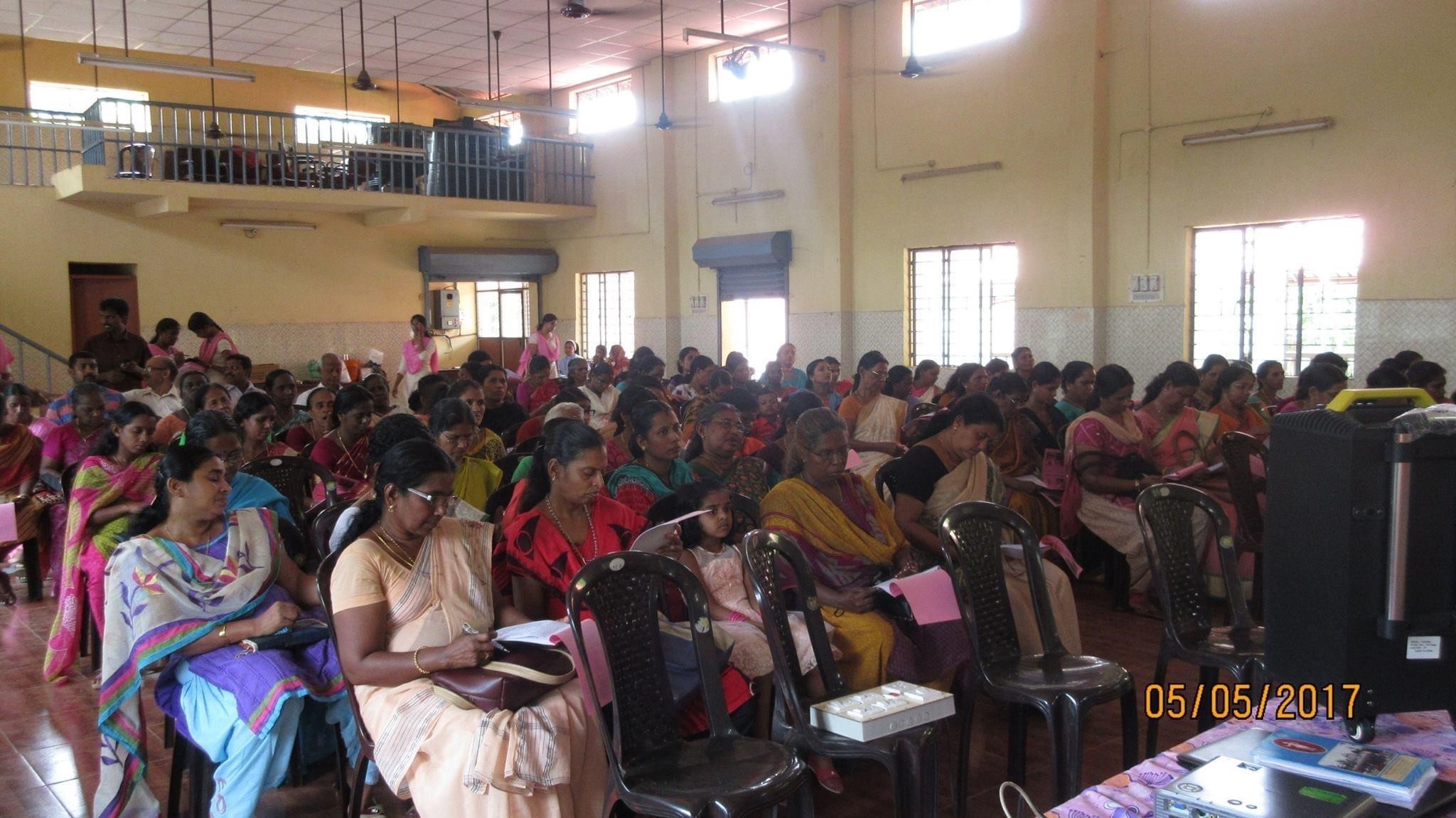
- Can you elaborate more on the social training programs and why you have them?
You see, most of these women have been working in the fields, as unskilled workers or have not worked at all. Working as a tailor or a plumber seems foreign to them.
They see it as a man’s job, not something which they can do. They have been formed to comply with the patriarchy of the society, where women should be kept inferior, paid less, treated low etc. They have to be made aware of their rights for equal wages, acquiring and doing skilled jobs, treated with dignity etc. For them to be successful on the field, it is necessary to change this mindset.
Social training is centered around the themes of gender equality and gender equity. We try to create avenues that provide for social, cultural and mental upliftment, to instil in them the self-confidence needed to take on these new jobs self-respect and right for her own space in the arena of well-paid works. For example, activities that train them in decision-making skills are required as most of these women are not involved in the decision making process at home. At the end of the training, we can see a tangible change in them. A lot of women even take up driving classes and have even bought their own vehicles as they need to have the freedom of movement from one workplace to another.
- What steps, if any, are taken to overcome any inhibitions or reservations which the various family members may have in sending their wives/ mothers to the center?
Before training starts, we pay a visit to their homes to brief their family about the program and what it entails. Any doubts or queries they have, are cleared to the best of our ability. In addition to this, we hold family get-togethers as a part of the training program. Here, we educate the family members about the importance of the training we provide, the need for equality in the family, the importance of bringing up sons and daughters in an equal fashion.
Let me give you an example of the difference that we have been able to make. The husband of a trainee, a carpenter was initially reluctant to send his wife for training. But now they both take up and work on carpentry projects together as a team. In another family, when the father fell sick, their school-going son took up his father’s job so that his mother’s training could continue uninterrupted.
- Have you faced any resistance from the contractors or builders in providing projects?
There is a big resistance to hire women as still they don’t believe in women’s capacities to be a builder! Besides, they are bound to go home at 5.00 P.M. Most contractors demand their workers to do overtime to which women cannot comply with. To some, we enter into an agreement and then it goes smoothly. Most of the work we take from individuals. They trust us and give us projects. We subcontract them to our workers who get the job done well and on time. There are some considerations that we should provide for women. For example, it may be difficult for them to reach the site at 8 AM as they have to take care of all the household chores. To counter this, we have a piecewise rate system, so they are paid for the amount of work they do and not for the number of hours they work. This allows the workers a certain degree of flexibility. The friendly environment that we provide helps them to work diligently and to the best of their abilities.
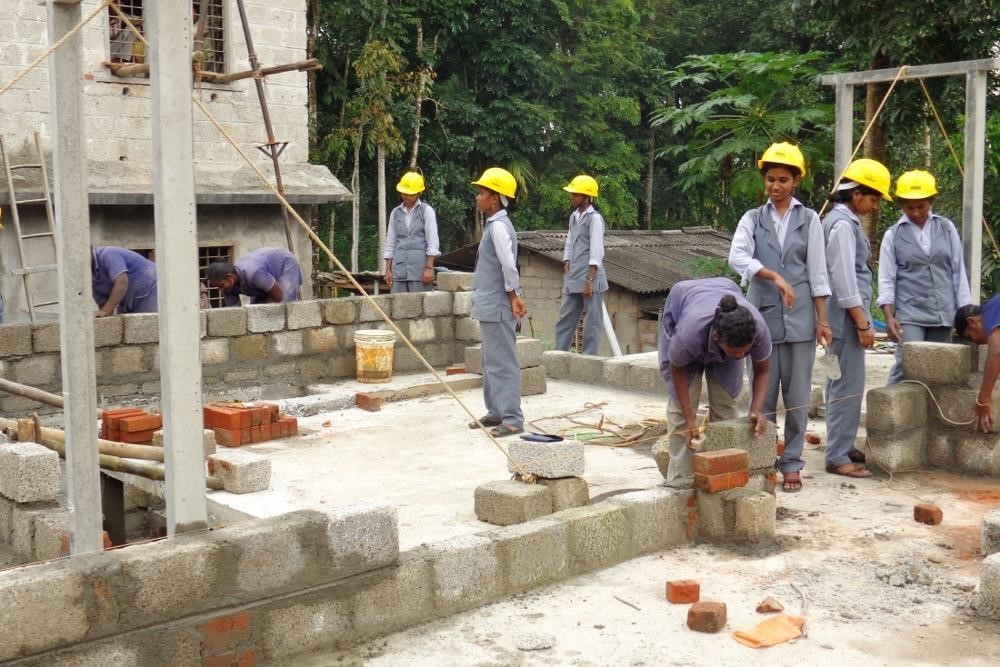
- Do you get help, in the way of funds from external agencies or the government?
We are an accredited agency with LSGD [Local Self Government] and Kudumbasree, which is a community organization of Neighbourhood Groups (NHGs) of women in Kerala. We are given funds to train Kudumbasree women in masonry. We also take up construction projects of the government like Life mission. We are also registered with KILA (Kerala Institute of Local Administration) and the various panchayats. In addition to this, we also receive funding from NABARD, KSWDC.
- How has your journey with the organization been so far?
Before the Archana Women’s Centre, I was a part of the activities of Thresiamma ma’am in Nalpathimala, Kottayam. I joined the organisation in 2004 when I was just 24 years old. In the early days, I used to be involved in all the activities as we had limited staff. It is only now that I have a more defined role as a program coordinator. I have grown along with the center and it is a huge part of who I am today. Initially, I had my reservations and prejudices against blue-collar jobs. Work with the organisation showed me that those jobs are essential, important, and demand the same respect as other jobs. In the various roles that I have performed and the various activities that I have undertaken as a part of this organisation has helped me realise my potential.
~
There are multiple lessons to be learnt from this quaint center, the successful replication of which can improve the livelihoods of many women across the country. A very important takeaway is how they have ensured that the needs of various stakeholders have been adequately addressed to create an amicable environment for all parties involved. This is a center for holistic learning which not only imparts the technical knowledge which the women will require but also takes care to equip them with the social skills and mental strength that they need to put the knowledge to practical use in this skewed industry.
About the expert
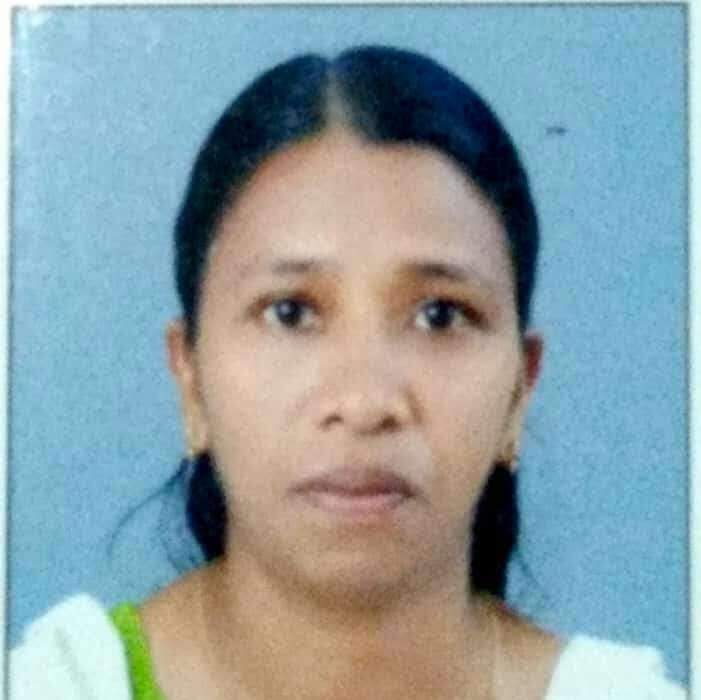
Ms. Jayasree has been involved in the skill training of informal female labourers for more than 16 years now. She has been a part of Archana Women’s Centre since its inception now works in the capacity of a program coordinator. The center is involved in providing skill training to women in various sectors such as construction, plumbing, and carpentry.
References
- Remote interview conducted by the team at Women’s Identity and Progress
Images
- Facebook page of Archana’s Women’s Center

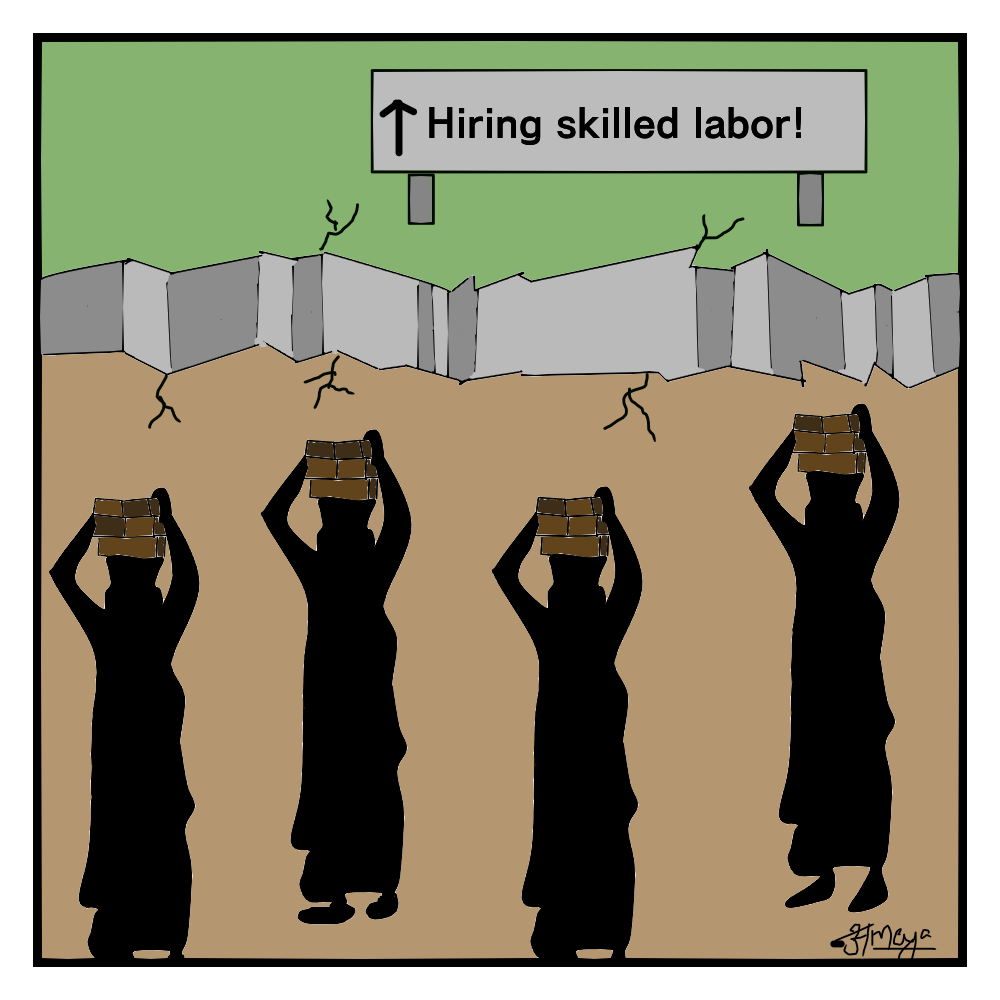
Leave A Comment